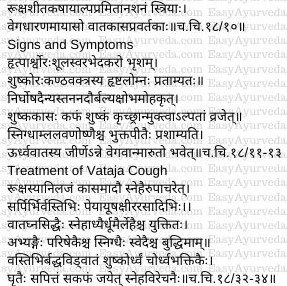Vataja Kasa – Causes, Symptoms, Treatment
Vataja Kasa means cough produced by vitiated vata. It is one among the five types of cough. Due to the impact of vata the cough is dry in nature with absence of or less expectoration of phlegm. This condition is associated with pain in the chest.
Read – Charaka Kasa Chikitsa – 18th Chapter

Table of Contents
Causative factors
Related to food
- Excessive consumption of dry foods
- Excessive consumption of cold foods
- Excessive consumption of foods with predominantly astringent taste
- Consuming less food
- Consuming food in limited way
- Not consuming food at all (starvation)
Related to activities and lifestyle
- Excessive indulgence in sex
- Forcibly withholding the natural urges
- Excessive indulgence of strenuous exercises / activities
Read – How to Live Healthy Everyday With Ayurveda
Signs and Symptoms
- Dry cough
- Dry phlegm is expectorated
- The phlegm is expectorated with difficulty after repeated coughing
- Phlegm is less in quantity
- Absence of sound when the person coughs
- Hollow and groaning cough
- Pain in heart, flanks and chest
- Dryness of chest
- Irritation in the chest
- Weakness of voice (Sushruta)
- Hoarseness of voice (Sushruta)
- Headache, pain in the temples
- Hoarseness of the voice
- Dryness throat and mouth
- Horripulation
- Weakness
- Abdominal pain (Sushruta)
- Tired and lusterless face (Sushruta)
- Physical weakness (Sushruta)
- Deterioration of ojas (Sushruta)
- Loss of consciousness
- Misery
- Delusion
Pacifying factors
Gets pacified by foods and liquids which are
- unctuous,
- sour,
- salty and
- hot
The people in whom the vata gets aggravated and moves upwards after the digestion of food, the bouts of cough are severe.
Read – Ayurvedic Home Remedy For Cough Due To Pitta Increase
Sanskrit Verses

Read – Easy Home Remedy For Cough With Trikatu
Treatment of Vataja Cough
Snehana – oleation
Oleation therapy should be first administered in vata type of cough to the person whose body has become dry due to vitiation of vata.
The below mentioned should be administered prepared with vata alleviating herbs in fats –
- ghee
- enema
- gruel
- soup
- milk
- meat soup
One or more of these shall be used in the below mentioned forms –
- unctuous smoking
- confection
- massage / anointing
- showering
Read – Ghee Home Remedy For Dry Cough
Swedana – sudation
When the person is properly lubricated with the fats used in the above said forms, he should be administered with sudation therapies.
Anuvasana Vasti – Fat enema
Medicated fats administered in the form of lubricating enema for constipation and when feces and fart are not voided properly in spite of above therapies.
Urdhwa Bhaktika Sneha – oral use of medicinal fats after food
In the patients having dryness in the upper portion of the body associated with pitta, ghee should be given for oral consumption after the patient has finished taking food. Here dryness in the upper portion of the body i.e. chest should be considered as having dry cough. So, in dry cough associated with pitta medicated ghee should be given after food.
Sneha Virechana – Unctuous purgation
Similarly in case of dry cough / dryness in the upper portion of the body associated with kapha, purgation should be given with unctuous formulations. Unctuous purgation formulations means oils or ghee prepared with purgative herbs.
Formulations for Vataj Kas
Kantakari Ghrta – It is a good appetizer, kindles digestive power and cures dry cough.(Cha.Chi.18/35-46)
Pippalyadi Ghrta – very useful for almost all chest conditions including cough, dyspnea / asthma, morbidity in heart and flanks
Tryushanadhya Ghrta – apart from cough, it cures fever, pain in head, heart and flanks, tastelessness, spleen enlargement jaundice and emaciation
Rasna Ghrta – this is said to cure all five types of cough and can be used in the form of nasal drops, oral consumption and enema.
Yavaksharadi Churna (Cha.Chi.18/48)
Karkatashringi Churna (Cha.Chi.18/50) – Powder of Pistacia chinensis mixed in oil and served Bharangi Nagara Churna (Cha.Chi.18/63) – Powder of Bharangi – Clerodendrum serratum and Ginger mixed with hot water.
Saindhavadi Churnam (Cha.Chi.18/63)
Khadirasara Churna (Cha.Chi.18/64) – Powder of Khadira – Acacia catechu should be consumed and wine, curds or curd water shall be taken as after drink.
Shatyadi Kalka (Cha.Chi.18/49)
Pippali Kalka (Cha.Chi.18/64) – Piper longum paste fried in ghee, mixed with rock salt and taken with wine, curds or curd water.
Avaleha / Leha – confections
Duralabhadi Leham (Cha. Chi. 18/50)
Dusparshadi Leham (Cha.Chi. 18/51)
Vidangadi Leham (Cha.Chi. 18/5)
Agastya Haritaki (Cha.Chi.18/57-62) – Herbal jam widely used to cure vataj cough. Apart from wide array of disorders, it is used to cure five types of cough.
Indications – If the patient of cough or rhinitis also has headache, nasal discharge and more of tama quality in the heart he should undergo medicated smoking.
Below mentioned wicks are useful in this direction –
Manashiladi Dumapana
Manashiladi Dhumapana – 2
Ingudyadi Dhumapana
Read – Importance Of Diet (Pathya) For Specific Diseases
Pathya – beneficial diet
Rice, barley, wheat and rice grown in 60 days should be included in the diet and should be consumed with one among the meat juice of animals living in marshy regions or water, soup of black gram or soup prepared with Mucuna pruriens.
Peya – drinks and gruels
1. Yavanyadi Peya
Gruel prepared with water processed using ingredients such as Yavani – Trachyspermum ammi, Long pepper, Ginger, Cumin etc is mixed with ghee / oil, sour pomegranate and rock salt.
Benefits – this diet cures vataja cough, pain in pelvis, heart, flanks and abdomen, dyspnea and hiccough.
2. Dashamuladi Peya – The rice etc boiled in Dashamula decoction and gruel prepared. This should be served mixed with powder of Panchakola and jaggery.
3. Shali-tiladi Peya
Rice, barley etc mixed with equal quantity of sesame, boiled in milk and consumed. Alternatively gruel prepared with sesame and rice is served mixed with rock salt.
4. Mamsarasa siddha peya
Gruel prepared with fish, cock or meat soup of pig mixed with rock salt and ghee.
Vegetables and food inclusions
- Vastuka – Chenopodium murale
- Vayasi shaka – Solanum nigrum
- Radish – Raphanus sativus
- Sunishannaka – Blepharis edulis
- Use of sesame oil and other similar oils for lubrication
- Milk, sugarcane juice and eatables prepared using jaggery
- Curds
- Sour fermented gruel
- Sour fruits and juices
- Supernatant part of wine
- Food substances predominant in sweet, sour and salt tastes
Yogas for Kasa Mentioned in Sahasra Yoga Text Book
Atisarahara Kashaya
Swasa kasahara Kashaya
Hikkadihara Kashaya
Koushikokta Rasnadi Kwatha
Kasa swasahara Yavagu
Panduhara Kashaya
Sannipata Jwaradihara Kashaya
Panchatiktaka Guggulu Ghrita
Vrisha Ghrita
Nirgundyadi Ghrita
Dasanga Ghrita
Sasa Vasadi Ghrita
Dhanvantari Ghrita
Maha kushmanda Ghrita
Balashwagandhadi taila
Tekaraja Rasa
Bhringalarkadi Taila
Amrutadi Taila
Bala Taila
Sudarsana Choorna
Sitopaladi Choorna
Pridhu Nimba Panchaka Choorna
Maha Khandava Choorna
Lavangadi Choorna
Tugadi Choorna
Swasakasadihara Choorna
Jivanthyadi Choorna
Trikatwadi Choorna
Yavanyadi Choorna
Talisapatradi Choorna
Jati Lavangadi Choorna
Karpooradi Choorna
Hingu Vachadi Choorna
Bala Soolari Choorna
Narasimha Choorna
Kalyana Kshara
Sudha kandadi Kshara
Draksharishta
Dasamoolarishta
Dhatryarishta
Bhringarajasava
kumaryasava
Kushmanda Rasayana
Manibhadra Guda
Agasthya Rasayana
Chyavanaprasavaleha
Bharngyadi Leha
Punarnavadi lehya
Vyaghryadi Lehya
Gudardraka
Matala Rasayana (Dadima)
Kasattinutiri (Kasahari Vati)
Suryaprabha Gutika
Neelakantha Rasa
Gaganeshwara Rasa
Jatilingadi Gutika
Dhanvantari Gutika
Bala Kuvaladi Kashaya
Cherupayaradi Kashaya
Ramacchadi Kashaya
Swasari Taila
Mamsa Sarpi
Amritaprasa Ghrita
Maha Mayura Ghrita
Ajamamsa Rasayana
Click to Consult Dr Raghuram Y.S. MD (Ayu) – Skype









